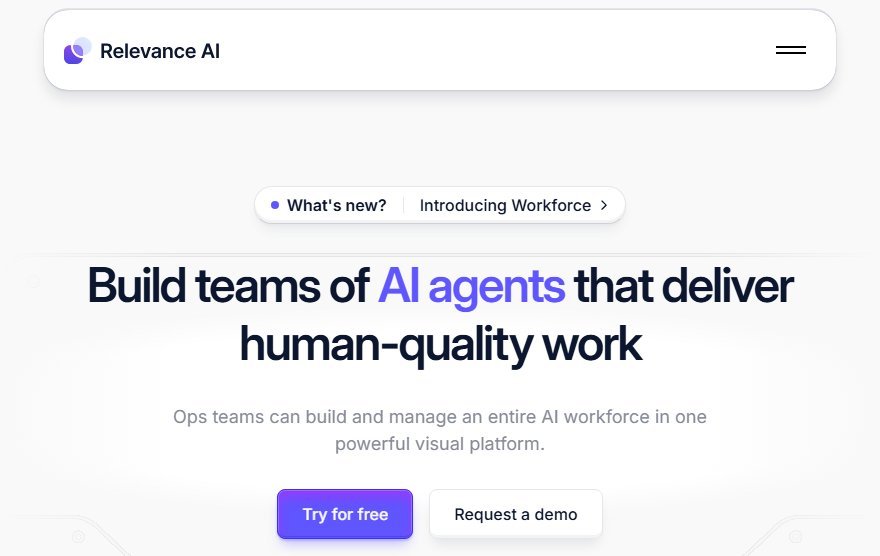Overview
Relevance AI revolutionizes how businesses leverage artificial intelligence by offering a dynamic platform to create autonomous AI teams tailored to specific needs. It combines advanced NLP, computer vision, and generative AI to streamline workflows, from research and analysis to conversational assistance. Whether it’s automating sales outreach with AI Sales Agent (Bosh) or deploying specialized agents for marketing and support, Relevance AI empowers users to put their processes on autopilot. Its standout features, like Custom Actions for GPTs integration and knowledge management with version control, make it a versatile solution for teams looking to scale efficiency without sacrificing precision.
Designed for forward-thinking businesses and professionals, Relevance AI eliminates the complexity of managing AI-driven tasks by providing a no-code approach to building an AI workforce. Its ability to handle diverse use cases—from deep data analysis to engaging customer interactions—makes it invaluable for organizations aiming to stay competitive. By blending automation with customization, Relevance AI doesn’t just replace manual labor; it enhances human potential, allowing teams to focus on strategy while AI handles the heavy lifting. The platform’s adaptability and focus on real-world applications position it as a game-changer in the era of intelligent automation.
Key Features
- Build autonomous AI teams for business processes
- AI Sales Agent (Bosh) for automated outreach
- AI Workforce with specialized agents for sales, marketing, and support
- Custom Actions for GPTs integration
- Knowledge management with version control
- Chat embed functionality for customer interactions
- Metadata management for data organization
- Scheduling and approvals workflow automation
- Python and Javascript SDKs for custom integrations
- Multi-agent collaboration and sharing capabilities
Use Cases
Academic Research and Data Analysis
RelevanceAI streamlines academic research by automating data collection, analysis, and synthesis. The tool can process vast amounts of scholarly articles, reports, and datasets to identify key trends, correlations, and insights. Researchers can leverage its natural language processing capabilities to summarize complex papers, extract relevant findings, and generate citations. This accelerates literature reviews, hypothesis testing, and evidence-based conclusions while reducing manual effort.
Market Intelligence and Competitive Analysis
For businesses, RelevanceAI provides powerful market intelligence by aggregating and analyzing industry data, competitor strategies, and consumer trends. The tool can monitor news sources, social media, and financial reports to deliver real-time insights. Users can ask conversational queries to uncover market gaps, benchmark performance, or track emerging technologies. This enables data-driven decision-making for product development, marketing strategies, and competitive positioning.
Technical Documentation and Knowledge Management
RelevanceAI enhances technical documentation processes by automatically organizing, indexing, and retrieving complex information. The tool can analyze codebases, API documentation, and engineering specs to provide instant answers to developer queries. It helps teams maintain up-to-date knowledge bases by identifying outdated content and suggesting improvements. This reduces onboarding time for new employees and improves cross-team collaboration through intelligent search and Q&A capabilities.
Personalized Learning and Education
The tool supports personalized education by adapting to individual learning styles and knowledge gaps. Students can engage in conversational learning, asking questions and receiving tailored explanations with relevant examples. Educators can use it to generate customized study materials, quizzes, and progress reports. RelevanceAI’s ability to break down complex topics into digestible concepts makes it valuable for both formal education and self-directed learning across diverse subjects.
Business Decision Support
Executives and managers leverage RelevanceAI for strategic decision support through data-driven insights. The tool analyzes internal reports, market data, and operational metrics to identify risks and opportunities. Users can simulate scenarios, ask “what-if” questions, and receive actionable recommendations. This conversational analytics approach helps leaders make informed choices about investments, resource allocation, and organizational strategy without requiring deep technical expertise.
Target Audience & Industries
Target Audience
RelevanceAI serves businesses and individuals looking to harness the power of AI for data-driven decision-making. Businesses benefit from streamlined workflows, enhanced customer insights, and automated processes, while individuals gain access to advanced analytics and personalized recommendations. The tool empowers users to extract actionable insights from complex datasets, saving time and improving efficiency.
Target Industries
RelevanceAI is particularly valuable for industries like e-commerce, finance, healthcare, and marketing. E-commerce businesses leverage it for customer behavior analysis and personalized recommendations. Financial institutions use it for risk assessment and fraud detection. Healthcare providers benefit from predictive analytics and patient data management, while marketing agencies rely on it for campaign optimization and audience segmentation.
Evaluation and Review
Advantages
- Enhanced Efficiency: Automates business processes with autonomous AI teams, reducing manual effort and speeding up operations.
- Versatile AI Capabilities: Combines NLP, Computer Vision, and Generative AI for diverse applications like research, analysis, and customer interactions.
- Seamless Integration: Offers Python and Javascript SDKs for custom integrations, ensuring compatibility with existing workflows.
- Scalable Workforce: Provides specialized AI agents for sales, marketing, and support, enabling scalable and tailored solutions.
- Improved Collaboration: Supports multi-agent collaboration and sharing, fostering teamwork across departments or projects.
- Streamlined Knowledge Management: Features version control and metadata management for organized and accessible data.
Limitations
- Learning Curve: The platform’s advanced features, such as multi-agent collaboration and custom SDK integrations, may require technical expertise or time to fully master.
- Dependency on Data Quality: AI performance, especially in NLP and knowledge management, heavily relies on high-quality, well-organized input data, which may require additional preprocessing.
- Integration Complexity: While SDKs and custom actions are provided, integrating with existing workflows or legacy systems might involve development effort.
- Cost Considerations: Scaling autonomous AI teams or specialized agents across large operations could lead to higher costs, depending on pricing tiers.
Other Information
Domain Info
Created at: 2018-04-30
Expires at: 2029-04-30
Interest over time
Worldwide. Past 90 days. Web Search.

